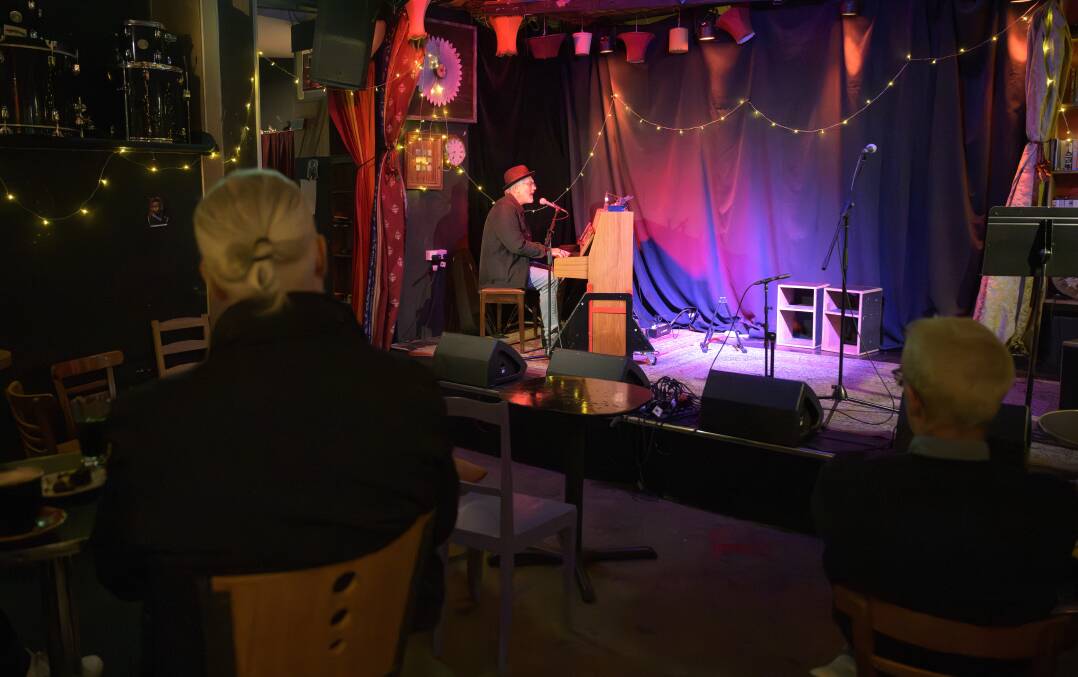Canberrans are going out for live music, but it might not be at festivals.
It's been a rough few years for the music industry in Australia - bushfires, COVID, floods and a hefty cost-of-living crisis.
Festivals have been cancelled, ticket sales are down, and the general consensus is musicians should start looking for another job.
But underneath the doom and gloom is a quiet revival of live music in places you wouldn't expect.
In a small bar in Canberra's CBD, students, businessmen and families listen to local singers while drinking tea on chairs that look like they came out of a grandma's house.

Owner of Smith's Alternative, Nigel McRae, said business was booming.
"We're doing as well as we ever had, possibly even a bit better. We have strong attendances at events, strong community engagement," he said.
"It's really important that people of all ages can come here and feel comfortable. There's a range of seating options, we want to accommodate everyone.
"I feel like our culture is changing. I think kids these days are drinking a lot less, and I think that's a good thing."
Regulars can come in for a drink and a ukulele jam, or chat with friends in a cosy corner at an open mic night.
Mr McRae's business is built on what he calls the "broadest possible denominator". That's everyone, from people with disabilities to mums and bubs.
A change in music taste
For Canberra boy Reuben Styles, one half of Aussie icon Peking Duk, it's a far cry from the boozy concerts of the last decade.
The cancellation of Splendour in the Grass and Groovin' the Moo has the DJ seriously worried for the future of Aussie music.
"Sadly, less and less of what the younger generation is exposed to is Triple J, it's what they're being fed by international algorithms, like Tiktok and Spotify," Mr Styles said.
"I don't think we have any way to become Australian music fans anymore because we don't have any Australian-centric ways to consume music."
He blamed this "globalisation of music" on the decreasing interest in Australian festivals.
Low ticket sales were blamed for the axing of several festivals in the last few years.
Many in the industry are pointing fingers at the declining attendance of young people, who are the traditional core demographic of festival goers.
A new report found people aged between 18-24 made up less than one-third of attendees in 2022-23.
The national survey also reported only half of Australian festivals turned a profit in 2022-23.
Local performances, but make it comfortable
But cancelled festivals and a change in music tastes aren't the full story for live music.
Every weekend, hundreds of Canberrans flock to Canberra's main theatre to catch Aussie acts like Shannon Noll, Jess Mauboy and Missy Higgins.
Director Alex Budd said demand for live music at the Canberra Theatre was stronger than it had ever been.
He said millennials and older generations were looking for a more comfortable and classy music event.
"I think people are making choices, and the artist and the experience that we're offering is where people are investing their money," he said.
"There's a brand around a venue like the Canberra Theatre, people like it, they want the seats, they want to feel comfortable.

"People are looking for a guarantee of a good night out."
The rising cost of living was playing into decisions, too.
Music ACT president David Caffery said Canberrans wanted value for money.
"People are more reticent to go out, so they're going out to things they know are going to be good," he said.
"That's why you see the top 1 per cent of concerts, the Taylor Swifts and the Coldplays of the world, breaking records.
"They're musicians they know really well and they're willing to spend the money on them."
It's a big change from the days of Cold Chisel and Silverchair, where concerts consisted of grungy pubs, mosh pits and pint after pint of beer.
Young Australians aren't drinking as much, and the partygoers of the 2000s are having kids and settling down.
They want a new sort of music event - something that's comfortable, cheap and a guaranteed good night out.
But that doesn't mean it's the end of the road for festivals.
Mr McRae reckoned they still had a part to play in Australia's music ecosystem.
"I think probably the future of festivals is smaller, medium-sized events that are grown out of communities and run by those communities, and that are doing more than hiring a big headline act and trying to sell as much beer as they can," he said.
"A smaller festival that is all about culture and the community, that's what's going to survive."







